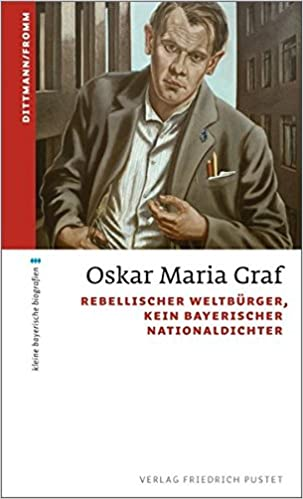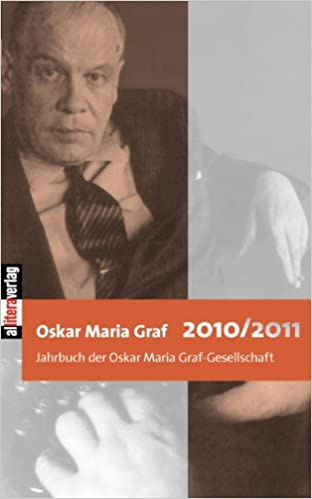Literature and Exile – Oskar Maria Graf, ProMosaik in a conversation with Dr. Dittmann of the OMGraf-Gesellschaft
By Hala Farrag, 16 April 2021. Ulrich Dittmann was born in Berlin in 1937. Up to the state exam in 1963 he studied at the universities of München und Durham (GB); Dittmann obtained his doctorate with a scholarship of the VW Foundation with Professor Walter Müller-Seidel on a Thomas Mann language topic. From 1965 to 2003, he was tutor, assistant, and academic adviser/director at the Institute for German Philology at the University of Munich. Besides his academic career as teacher, he worked at the historical-critical edition of the works of Adalbert Stifter; 1992 he founded the Oskar Maria Graf Foundation (OMG-Stiftung) in Munich and was its 1st chairman until 2015.

How important is it to remember writers in exile?
During the “1000 years” from 1933 to 1945, the so-called “inner émigré literature” was loyal to the regime and/or shadowed by the totalitarian regime. All authors who continued the literary awakening after the turn of the century and from the 1920s were banished into exile as “undeutsch” (un-German) unless they failed due to the borders or bureaucracy of host countries.
It was only after 1945 that people – with a sigh of relief – resorted to the Expressionists of the Twilight of Humanity, the approaches of Dada and New Objectivity. The end of the war in 1945 freed the language, but a literature market soon developed again. And exiled authors were unable to assert themselves immediately on this market. Since there were two Germanys and the Iron Curtain separated the FRG and the GDR, the works created abroad met with different acceptance levels which depended on the respective ideological orientation.
Political standards determined what authors could write between 1933 and 1945 in Prague, USA, Mexico, Russia and elsewhere. What was published in one part of Germany was undesirable in the other part. Thomas Mann was read on both sides of the Iron Curtain, Heinrich Mann, Feuchtwanger, and other politically active authors – the anti-fascists – on the other hand were read mainly in the GDR. In both countries, step by step the own exile research was established, which, in addition to the work of literary societies dedicated to individual authors, took care of the continuity of the uncontaminated writing in the German language.
Works written beyond the regions ruled by the Nazi doctrine are now considered to be the actual German literature of the years 1933 to 1945.
What characterizes Oskar Maria Graf among the exiled writers? Do you think that there are other writers in exile who are comparable with Oskar Maria Graf?
Thanks to his nature and his talent for storytelling, Oskar Maria Graf was a welcome guest at all three exile stations – Austria, Czechoslovakia, and the USA – even if due to his ‘leftist’ attitude as a stateless person residing in New York he could not return to Bavaria. He consistently adhered to the German language and the Bavarian dialect and, despite great financial hardship, he always remained in the centre of a circle of friends. He also remained true to his basic convictions, his trust in a popular front of the left parties and the indivisibility of German literature. This is the reason why he published in both German states until his death.

What role can literary societies like yours play in the current literary landscape? How can your literary society reach more prospects in our lockdown age, from the local to the international?
Literary societies not only gather an author’s reading audience and try to promote its expansion. They help literature students and pupils with an archive created for the work and the collected editions; they publish the yearbook and possibly also a journal on the work, they maintain their own website, organize regular readings and conferences, they arrange a monthly get-together, encourage new editions and take on the organization of the corresponding celebrations for the cultural administrations of the cities and regions on the biographical anniversaries: The Oskar Maria Graf Gesellschaft was founded in 1992 by the municipality of Munich in order to commemorate and celebrate the author’s 100th birthday in 1994 over a period of 12 months. – The ALG, Arbeitsgemeinschaft literarische Gesellschaften (working group of literary societies), whose board members meet annually, organizes stimulating conferences in order to research and discuss personal, political and literary references. – Since the lockdown currently prevents social contacts, unfortunately, the work of the society has to be reduced to the yearbook, website and email contacts.
What ways would there be to re-publish the out-of-print work by Oskar Maria Graf and other forgotten writers, so to bring their work back into the light of reading and research?
The work of Oskar Maria Graf is available in selected individual volumes of two editions which are well distributed. However, they are not coordinated with one another: A “last hand” edition provides the revised versions of important books/essays (Süddt. Verlag 17 volumes + 1 letter volume) while the other includes the more convincing first versions (List-Verlag 16 volumes); this creates a certain dilemma for the readers of Oskar Maria Graf because sometimes a text ends like this and then again it has a completely different conclusion. A more recent third paperback edition offers in 14 volumes (Allitera-Verlag) faithful reprints of the first editions, whose original copies were published before 1933. However, they often fell victim to the Nazi book burnings.
How current is the topic of isolation, the foreign and the connection between the local and global level today in our lockdown era?
This is an interesting question. And it can be answered by making reference to the pandemic threat to simple physical life and to a correspondingly different solidarity of the people: The isolation is something we can call universal. And this isolation was quite different in political exile: The origin and the political orientation resulted in the creation of different camps that feuded as they were exposed to different conditions in the host countries. This is also the reason why isolation was experienced in a more existentially threatening manner.



